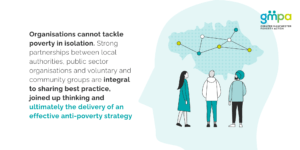 Case studies
Case studies
Local anti-poverty strategies provide local authorities and partners with greater consistency, close coordination of policy, and a sense of direction to address poverty when carefully planned and implemented.
Browse through our case studies to see the strategic approach councils across the country are taking in response to growing poverty.
Salford City Anti-Poverty Strategy
In 2021, working with organisations including GMPA, the council refreshed its second four-year Tackling Poverty Strategy as one of the three interlinked strategies launched under the ‘Salford Way’. Whilst the council is acutely aware that there is no ‘magic bullet’ to tackle poverty at a local level, the strategy and its accompanying high-level action plan provide a clear agenda for actions to be taken, embedding an anti-poverty culture within the council, and putting those with lived experience of poverty at the heart of decision making.
Rother District Anti-Poverty Strategy
In response to growing poverty levels in a number of localities in Rother, the council committed to developing an anti-poverty strategy as part of the council’s corporate plan 2020 to 2027. The council is realistic in its ambitions, as a district council it is limited in what it can do, despite this the strategy and its accompanying action plan are part of its new approach to making positive changes on what it can control and increasing its influence to engage with others to make changes beyond what it can control.
East Devon District Anti-Poverty Strategy
The anti-poverty strategy is a three-year strategy from 2021 to 2024, which is accompanied by an action plan. The council recognises that they do not have all the answers and many areas are outside of their control or influence, nevertheless, they are committed to making sure the council leverages its power and influence where possible to make a difference to residents. The creation of the strategy has provided a clear framework for addressing poverty in East Devon and focuses on the areas the council does have the opportunity to improve and influence.
Cambridge City Anti-Poverty Strategy
Cambridge is a wealthy, fast-growing city with a strong economy and significant employment growth in the science and technology sectors, however there is a significant divide in the city with a significant proportion of people experiencing poverty. In light of this inequality, the council’s vision ‘One Cambridge – Fair for All’ prioritises tackling poverty and social exclusion. The Corporate plan 2022-27 sets out the council’s four key priorities, priority two ‘tackling poverty and inequality and helping people in the greatest need’ outlines the council’s anti-poverty strategy and accompanying action plan for 2020 to 2023. The council’s approach focuses on tackling both the underlying causes and immediate effects of poverty, working in partnership with key local partners.
Leicester City Anti-Poverty Strategy
When the City Mayor was re-elected in 2019, the Mayor’s vision set out a number of pledges to fulfil ambitions to improve the city region. Under the ‘A fair city’ pledge was a commitment to ‘fight against austerity’ and develop an anti-poverty strategy in the first year of the new term. The strategy is focused on enabling the council and its key partners to better understand the nature and impact of poverty on people that use their services to improve services and/or develop new ones. The council’s anti-poverty framework and approach are on a microsite, to allow the strategy to be constantly updated as the national and local situation changes.
Scottish Borders Anti-Poverty Strategy
In Scotland, there is legislation that requires Scottish local authorities and health boards to jointly prepare Local Child Poverty Action Plans detailing the activity they are taking and will take to contribute towards the Child Poverty targets set out in the Act. However, Scottish Borders was motivated to create a dedicated anti-poverty strategy as there was no overall coordination between the council and its partners to address poverty. The overarching strategy establishes a strategic framework to improve how the council and its partners collaborate to tackle the significant challenges associated with poverty reduction.
